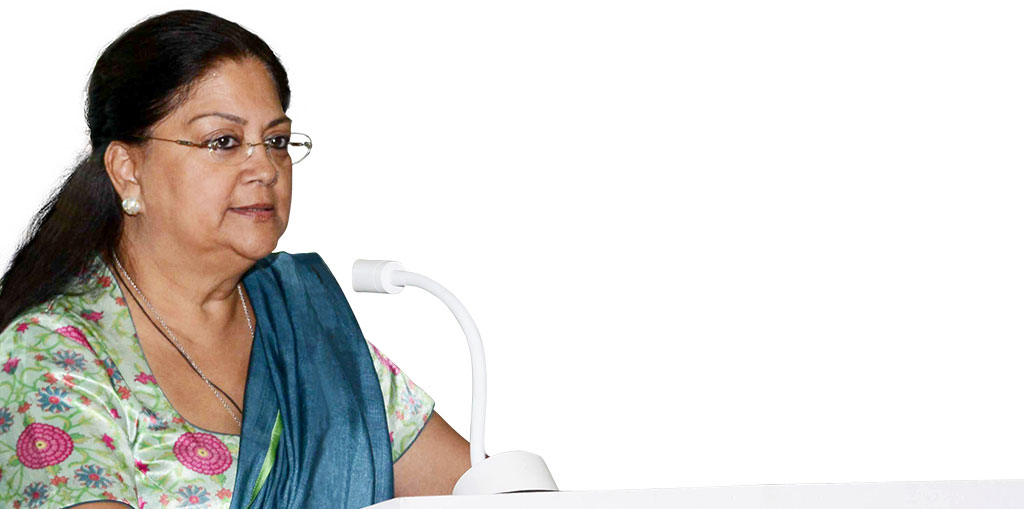We believe in unifying hearts to share a vision
Rajasthan chief minister Vasundhara Raje completes three years in office on December 13. As she prepares to head into assembly elections two years later, Raje thinks it’s time to talk about ‘solid results’ her work in the last three years has yielded.
In an interview to Hindustan Times’ Rakesh Goswami, she talks about her pet projects and her equation with Centre.
We believe in unifying hearts to share a vision. When people share your vision, they work towards the same goal. We want our people to live and work in a salubrious atmosphere.
HT: What do you think is your biggest achievement in the last three years?
VR: Bhamashah Yojana, the financial inclusion scheme in which we made women head of their families. We integrated all social security schemes with the Bhamashah card, a bouncy, useful card. In 3 years, we have created an enormous database with this scheme. 1.5 crore bank accounts have been opened. We launched this scheme in 2008 but after we were voted out, the incumbent government stalled it. I can say that it was our first step towards racing on the digital economy highway. The Bhamashah has spawned a digital revolution in the state – you get ration through it, there’s a health insurance linked to it and the benefits are transferred to your bank account. Only the woman in whose name the card is issued can withdraw that money.
HT: Only one scheme in 3 years?
VR: That’s the biggest. There’s the Mukhyamantri Rajshri Yojana through which we increased the incentive to girl child from Rs 7,300 to Rs 50,000. All girls born after June 1, 2016, get Rs 50,000 in six installments – you get Rs 2,500 at birth, Rs 2,500 on completing one year, Rs 4,000 when she goes to Class 1, Rs 5,000 on completing primary school, Rs 11,000 when she gets into Class 10 and Rs 25,000 on completing school or 18 years. I don’t think any other state in the country gives so much incentive to promote the birth of girls. We have also tightened screws on people indulging in sex determination tests, which lead to the killing of girls in wombs. I’m happy to tell you that in January 2016, sex ratio at birth in Rajasthan was 929. Imagine we were having 888 girls for every 1,000 boys in 2011 census.
HT: You started schemes such as this one but put brakes on schemes such as the free medicine scheme started by your predecessor.
VR: We didn’t stop any schemes – we introduced better ones. For example, we brought in Bhamashah health insurance to provide free indoor treatment to more than 1 crore people. We are preparing health data of our people through Aarogya Rajasthan. Under this, we have put data of 3.72 crore people online after a survey of 94.32 lakh families in rural Rajasthan.
HT: Is it true that you don’t enjoy cordial relations with the Centre and that has delayed cabinet expansion?
VR: There have been rumours that I will be replaced, did anything happen? We enjoy the full support of the Prime Minister. He launched Soil Health Card scheme from Rajasthan. The PM patted our back for Mukhyamantri Jal Svalamban Abhiyan (MJSA), plantation drives and for success in recent local body by-elections. Rajasthan got the opportunity to host FIPIC (the second summit of Forum for India-Pacific Islands Cooperation, a forum between India and 14 Pacific island nations, was held in Jaipur on August 21, 2015). All this is not possible without the Centre’s support.
HT: Your critics raise questions over the success of Resurgent Rajasthan and GRAM.
VR: For the first time in 69 years of Independence, there was an event whose pivot was the farmer who gives us food. There were MoUs worth Rs 4,400 in this historic programme. Our farmers, who are experts of traditional farming, got a chance to come face to face with modern technology. We are moving towards doubling farmers’ income by 2020. In Resurgent Rajasthan, apart from solar energy projects, the proposed investment is of Rs 1.45 crore. Investments of Rs 1.08 crore are already in the process of implementation. This is country’s biggest and the fastest rate of bringing investments on ground.
HT: Your collectors often talk about increasing the happiness quotient of people. What is that?
VR: We believe in unifying hearts to share a vision. When people share your vision, they work towards the same goal. We want our people to live and work in a salubrious atmosphere. I have told all my collectors to bring smiles to people’s faces. We started toy banks to share toys, mobile libraries for sharing books, we share clothes, we were working together towards water conservation, providing sanitary napkins to our adolescent girls so that they don’t drop out of schools because of this, there are common exercise points, we are opening Annapurna rasois (kitchens) to provide subsidised food … These are all done to increase people’s happiness quotient.
(As published in HindustanTimes.com)







